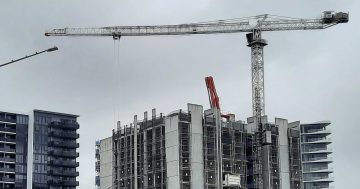
The government says the bill will improve building quality and protect home buyers, particularly in the apartment sector. Photo: Ian Bushnell.
Property developers will be held liable for defects along with builders and landowners for up to 10 years under the ACT Government’s licensing legislation to be introduced to the Legislation Assembly on Thursday (30 November).
Under the bill, multiple developers can be pursued to fix defects, even if they have gone bust, with rectification orders able to be given to the directors.
The onus will be on builders and property developers to prove a defect claim is false; otherwise, they will be presumed liable. This presumption will operate for the first two years from when a certificate of occupancy is issued.
The bill sets out various penalties for failing to fix defects and the Territory can order work to be done by an authorised contractor at the developer’s cost.
It establishes a register of licensed developers, defines what is considered to be a suitable person to be licensed and sets up a range of requirements, offences, regulatory actions and penalties, including revoking or suspending licences, if developers transgress.
A registrar will also be established to run the scheme and be given significant enforcement powers.
The bill establishes powers of entry to premises for authorised persons without consent to monitor compliance or if an offence may be or has been committed, unless it is a residential address where a warrant will required.
The registrar will also have powers to access personal information to assess complaints.
Developers will have appeal avenues, be able to take a licence suspension to the ACT Civil and Administrative Tribunal for review and go to the Supreme Court for a rectification order, stop work order or compliance cost notice revoked or varied within 30 days.
The ACT Property Council has long opposed developer licences, saying they would drive up costs, increase uncertainty and slow construction in the national capital.
Executive director Shane Martin has said the government’s approach is overkill and will only deter investment, exposing developers to unreasonable risks and forcing them to do business elsewhere.
He argues developers are hardly ever builders, and it is the trades that do the work that should be licensed.
Master Builders ACT CEO Michael Hopkins agrees, saying the ACT’s building regulatory system is the weakest in the country when it comes to holding trade contractors accountable, allowing anyone, for example, to call themselves a waterproofing expert without experience or qualifications.
Mr Hopkins said designers and architects were left out of the accountability chain, meaning builders and developers would be left holding responsibility for the failures of others in the building process.
He said that rather than finalise the Alternative Dispute Resolution reforms which were commenced in the last term of government, the new Bill includes a significant amendment to the onus of proof provisions which would only encourage buyers to pursue costly litigation against builders and developers when building defects arise.
“Before the Bill commences the MBA is calling on the ACT Government to commit to implementing all 24 recommendations of the Building Confidence Report which it helped prepare in 2018,” Mr Hopkins said.
“Unless the ACT Government is willing to implement a full framework of accountability for designers, trade contractors and supervisors, including minimum training and experience requirements, and aligned liability periods for developers and all building practitioners, then the government’s attempt to hold property developers to account will fail.”
But the government says it is responding to ongoing complaints about building quality and a lack of accountability, particularly in the booming apartments sector.
Minister for Sustainable Building and Construction Rebecca Vassarotti said the proposed scheme would tackle the problems of defects and compliance failures in residential property developments that appear before, during, and after construction.
“When Canberrans buy or rent a home, they should be able to demand the best from those who built them,” Ms Vassarotti said.
“This Australian-first move aims to give Canberrans the confidence that their homes will be built to the highest standards by trustworthy professionals. To put it simply, it’s all about quality.”
Ms Vassarotti said high-profile cases of poor development had undermined the trust of Canberrans in the home building industry and dodgy developments had cost Canberrans more than $50 million each year.
“This law change will add property developers to the chain of accountability for building quality and safety,” she said.
“Our legislation will establish a Property Developer Registrar which will have strong powers to be able to take regulatory action against developers that do the wrong thing. It will compel them to fix problems and face fines or suspend or revoke their licence if they don’t rectify works accordingly.”
Earlier this year, the government introduced a new Engineers Registration Scheme, and it will also look at further regulatory changes, such as trade licensing, to “complete the puzzle of building supply chain accountability”.
The Developer Licensing Bill is expected to be debated in the first half of 2024, with a transition period to follow before the licences will be required.



















